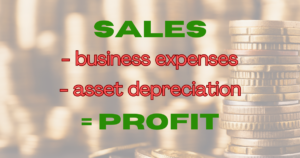I need to pay my taxes. That’s where most of my small business clients start. You start a little business, you make a few sales, then you come to me in the spring to pay your taxes. This is business income tax. It is the most complicated tax, and the most universal. There is no escaping income tax. When you are a business, it can get very complicated. How do you know what to do? You are reading my blog, that is a good start. Let’s look at business income tax: What it is, how to pay it, and the giant add-on that no one talks about.
Business Income TaxIncome tax is based on your income. Easy, right? But wait, is that my sales? How do I get ‘write-offs’? Do my kids count? Let’s take a look. Your business is taxed on its profit.
Profit is all of your sales, minus everything it cost you to make that money. That’s as easy as it gets. You can deduct whatever it cost you to make that money. The IRS says that it has to be “reasonable and necessary” to be deducted, but it isn’t all pencils and apps and tools. If you have an office, you need furniture and decorations on the walls. If you are in outside sales, you likely have meetings in restaurants every day. A fishing guide? You are going to need a boat and fishing gear. A convenience store? You are going to need cigarettes, beer, and lottery tickets. Everyone’s business expenses look different. However, not everything is an ‘expense’. Expenses are things that are ‘used up’ and no longer have value. If you pay your insurance or phone bill, you can’t get that back. You can’t get your rent back or what you paid your employees. However, you still have all that office furniture and that fishing boat and those shelves full of beer and cigarettes. It still has value and you can sell it. That is an asset. Anything you still have that can be sold is not an expense. It is not ‘used up’. Assets are things that will last a while. Assets are deducted over several years using depreciation. Sometimes, tax laws allow you to depreciate assets all at once like an expense. But not always. You need to keep records of your income, business expenses, and assets to calculate your profit and then your income tax. Where do I pay Business Income Tax?Most small businesses do not pay income tax. Whaaat? I said what I said. Almost every small business is a pass-through. The business has a profit or a loss that is passed through to the owners, who then pay the taxes on their regular form 1040 taxes. Of all the thousands of tax returns I have done, I can think of two that worked out better a different way. Small businesses are pass-throughs. The owners add the profit to their other personal income and pay on their personal income tax forms.
More TaxesMost states also require that you report your income and pay income tax. If you live in one state but run your business in another you need to file wherever you operate your business, plus report income in the state where you live. This can get complicated if you operate in multiple states. All but 7 states charge income tax, so be sure to report your states, too. The Biggest Add-on: What is SECA?SECA is also known as self-employment tax. It is also collected on the profit of your business and paid on your personal income tax forms, just like income tax. But it is not income tax. SECA is how self-employed people pay into Social Security and Medicare for the work they do. It is a little over 14% of your business profit. Make no mistake, that is a lot of money. You pay into SECA even if you only make $400 in your business all year. If your business is reporting on form 1065, Schedule C, or Schedule F, your will most likely owe SECA in addition to income tax. SummaryBusinesses calculate their profits. Profits are added to your other personal income and taxed on your 1040. Most business owners also owe SECA when they pay their income taxes. If you want to learn more about business expenses on the IRS website, click here. The next blog in this six-part series is about collecting sales tax. Check it out here. |
